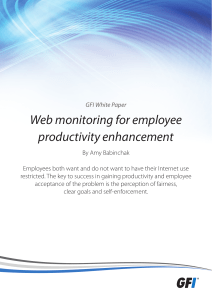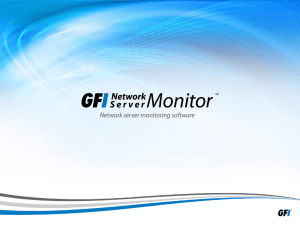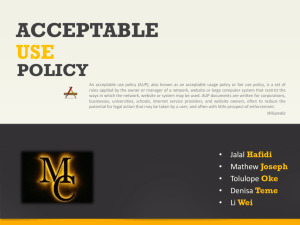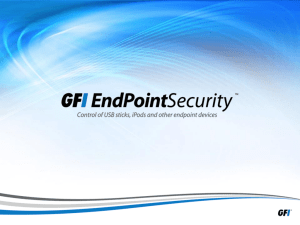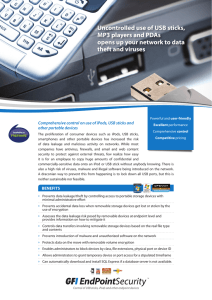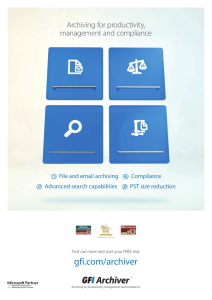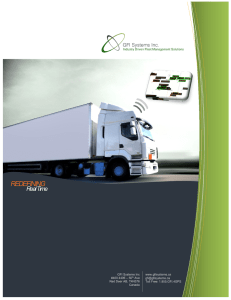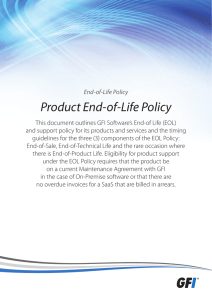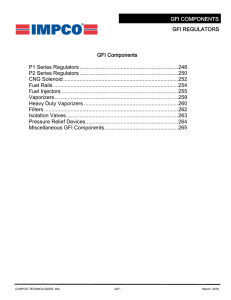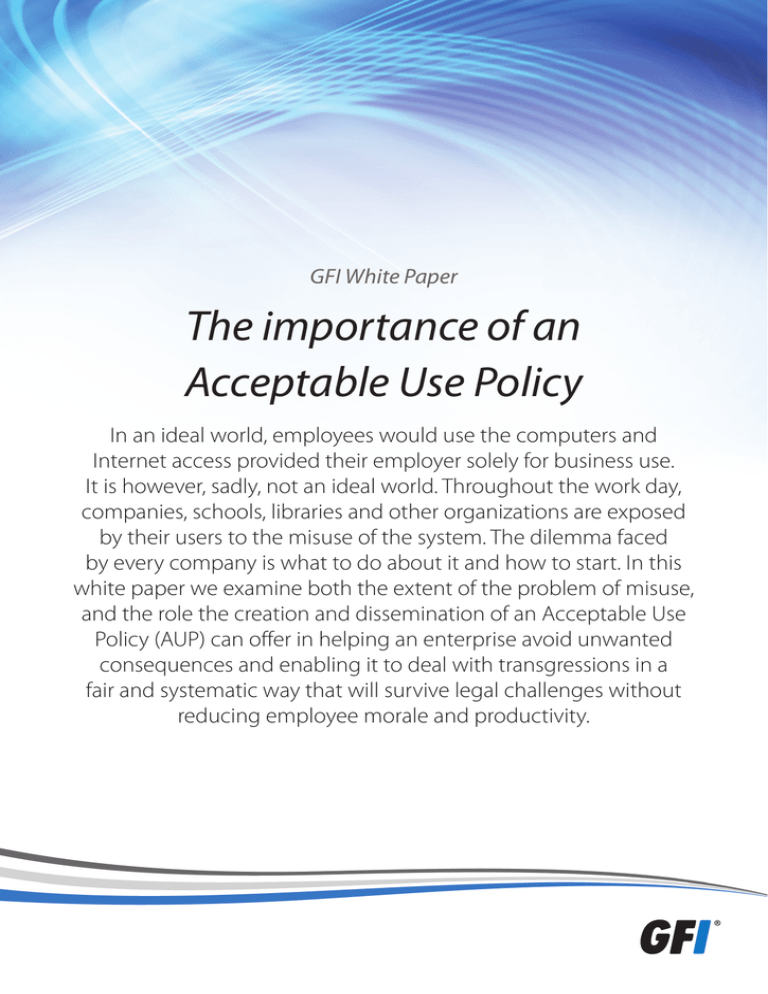
GFI White Paper
The importance of an
Acceptable Use Policy
In an ideal world, employees would use the computers and
Internet access provided their employer solely for business use.
It is however, sadly, not an ideal world. Throughout the work day,
companies, schools, libraries and other organizations are exposed
by their users to the misuse of the system. The dilemma faced
by every company is what to do about it and how to start. In this
white paper we examine both the extent of the problem of misuse,
and the role the creation and dissemination of an Acceptable Use
Policy (AUP) can offer in helping an enterprise avoid unwanted
consequences and enabling it to deal with transgressions in a
fair and systematic way that will survive legal challenges without
reducing employee morale and productivity.
Contents
The extent of misuse
3
Solutions
3
Acceptable Use Policy
3
What should be in an Acceptable Use Policy?
4
Ideally an AUP should do the following
4
Summary
5
About GFI®
5
The importance of an Acceptable Use Policy
2
The extent of misuse
According to a survey by International Data Corp (IDC), 30 to 40% of Internet access is spent on non-work
related browsing, and 60% of all online purchases are made during working hours.
The data IDC uncovered includes:
»»
»»
»»
70% of all web traffic to Internet pornography sites occurs during the work hours of 9am-5pm.
»»
»»
»»
»»
»»
48% of large companies blame their worst security breaches on employees.
»»
»»
»»
»»
25% of corporate Internet traffic is considered to be “unrelated to work”.
»»
9 0% of respondents (primarily large corporations and government agencies) detected computer security
breaches within the previous 12 months, 80% acknowledged financial losses due to computer breaches,
44% were willing and/or able to quantify their losses, at more than $455 million.
58% of industrial espionage is perpetrated by current or former employees.
8 0% of computer crime is committed by “insiders”. They manage to steal $100 million by some estimates;
$1 billion by others.
64% of employees say they use the Internet for personal interest during working hours.
70% of all Internet porn traffic occurs during the nine-to-five work day.
37% of workers say they surf the web constantly at work.
9 0% of employees feel the Internet can be addictive, and 41 percent admit to personal surfing at work for
more than three hours per week.
30-40% of lost productivity is accounted for by cyber-slacking.
32.6% of workers surf the net with no specific objective; men are twice as likely as women.
2 7% of Fortune 500 organizations have defended themselves against claims of sexual harassment
stemming from inappropriate email.
Solutions
One solution to the problem, beyond simply disabling the connections or depending on sometimes
unreliable URL blockers, is to use Internet monitoring systems (see GFI whitepaper: ‘Internet monitoring’).
According to IDC,
»»
7 7.7% of major US companies keep tabs on employees by checking their email, Internet, phone calls,
computer files, or by videotaping them at work.
»»
63% of companies monitor workers’ Internet connections and 47% store and review employee email.
Acceptable Use Policy
While monitoring has been an effective tool in identifying abusers and cyber-slackers, Human Resources
experts, as well as the courts agree that it needs to be accompanied by evidence of a “duty of care” intended
to reduce unacceptable employee activity. A key aspect of this is what is commonly referred to as an
Acceptable Use Policy.
Nearly every enterprise has a specified set of rules, usually spelled out in an employee handbook, that an
employee has to acknowledge by signature that he or she has read and understood. Some of these policies,
such as that against racial or religious discrimination and mandatory email archiving are required by law or
regulation. Others may reflect common business ethics or a particular company’s culture such as prohibitions
against drinking, unexcused absences, sexual harassment and the like. Policies also include a set of sanctions
that can be used against persons who violate the company’s policies. They also provide a legally defensible
basis for disciplinary action, up to and including termination.
The importance of an Acceptable Use Policy
3
One key advantage to policies like this is that while, traditionally, employers have been held responsible
and liable for their actions in the workplace, the presence of policies prohibiting such actions has served
as a liability shield that can completely or partially protect that company from lawsuits arising actions from
employees acting in contravention of the policies.
To safeguard its electronic communications, every company, large or small, should have an Acceptable Use
Policy in place that governs Internet, email and computer use in the business.
In essence, an Acceptable Use Policy serves as guidance for staff and volunteers on the behavior and use
of technology that is approved by the organization. The policy should also detail the consequences that
company personnel can expect to face for the abuse of this technology.
What should be in an Acceptable Use Policy?
As discussed earlier, monitoring voice mail, email and Internet use is generally legal, provided the employer
has created and effectively communicated an Acceptable Use Policy. While the exact wording of the AUP will
vary from company to company, there are some general guidelines on how an organization communicates
such policies to its workers.
The key goal of an AUP is to eliminate any employee expectations that these means of communication or use
of computers, email and the Internet at work are confidential. The policy must be non-discriminatory and it
should prohibit all forms of non-business related communications. To this end, the policy informs employees
that the employer may access, search and monitor voice mail, email or company files of any employee that are
created, stored or deleted from company computer systems. The policy must be uniformly enforced through
employee education, ongoing monitoring and appropriate discipline. Obtaining prior consent will generally
protect employers from liability.
Ideally an AUP should do the following:
»» Define what systems are covered by the policy, e.g., voice mail, email, Internet, and computer systems and
files.
»»
S pecify that an employer’s computer systems are for business purposes only, and all files and messages
are company property.
»»
If the company chooses to allow some personal use, the policy should caveat this by forbidding personal
use that interferes with an employee’s work or that of others (e.g., prohibiting non-work related websites
such as chat rooms, games, travel, shopping, stock trading, hate/discrimination, pornography, etc.).
»»
S pecifically ban transmitting or downloading of material that is discriminatory, defamatory, harassing,
insulting, offensive, pornographic or obscene.
»»
rohibit copying and sending any confidential or proprietary information, or software that is protected by
P
copyright and other laws protecting intellectual property.
»»
»»
»»
Prohibit unauthorized access by employees of other employees’ electronic communications.
Warn employees that any misuse will be subject to discipline, up to and including termination.
dvise and emphasize employees that they have no right to expect that their communications or use of
A
employer’s computer information systems is either confidential or private.
After the AUP is drafted, organizations should require the employees to sign the AUP. Some companies have
also taken the further step of installing an on-screen warning about their electronic communications policy
that appears every time employees log onto their computers.
The importance of an Acceptable Use Policy
4
Summary
Misuse of the Internet, email and computers in the workplace represents a serious and growing challenge to
every organization, regardless of size. In addition to potential illegal activity, disclosure of company secrets and
introduction of malware, misuse of these systems has a real dollar cost in terms of lost productivity. To date,
the most successful means of combating this has been through monitoring, by a variety of means.
The first step in any organization’s defensive measures against abuse is a prior consent statement, commonly
referred to as an Acceptable Use Policy that specifies that employees have no right to an expectation of privacy
with respect to their use of business computers, email systems and Internet connections. The AUP also details
unacceptable activities, specifies sanctions, advises of the potential for monitoring and places responsibility for
inappropriate behavior on the employee who transgresses those rules. The AUP should be widely disseminated
and employees required signing and acknowledging their understanding of it. In addition to providing
employees throughout the organization with clear definition of the organization’s expectations, a properly
executed AUP can serve as a liability shield for the organization in the event of misbehavior by an employee, as
well as a legally sanctioned basis for disciplinary actions, including termination.
About GFI
GFI Software provides web and mail security, archiving, backup and fax, networking and security software
and hosted IT solutions for small to medium-sized enterprises (SMEs) via an extensive global partner
community. GFI products are available either as on-premise solutions, in the cloud or as a hybrid of both
delivery models. With award-winning technology, a competitive pricing strategy, and a strong focus on the
unique requirements of SMEs, GFI satisfies the IT needs of organizations on a global scale. The company has
offices in the United States (North Carolina, California and Florida), UK (London and Dundee), Austria, Australia,
Malta, Hong Kong, Philippines and Romania, which together support hundreds of thousands of installations
worldwide. GFI is a channel-focused company with thousands of partners throughout the world and is also a
Microsoft Gold Certified Partner.
More information about GFI can be found at http://www.gfi.com.
The importance of an Acceptable Use Policy
5
USA, CANADA AND CENTRAL AND SOUTH AMERICA
15300 Weston Parkway, Suite 104, Cary, NC 27513, USA
Telephone: +1 (888) 243-4329
Fax: +1 (919) 379-3402
ussales@gfi.com
UK AND REPUBLIC OF IRELAND
Magna House, 18-32 London Road, Staines, Middlesex, TW18 4BP, UK
Telephone: +44 (0) 870 770 5370
Fax: +44 (0) 870 770 5377
sales@gfi.co.uk
EUROPE, MIDDLE EAST AND AFRICA
GFI House, San Andrea Street, San Gwann, SGN 1612, Malta
Telephone: +356 2205 2000
Fax: +356 2138 2419
sales@gfi.com
AUSTRALIA AND NEW ZEALAND
83 King William Road, Unley 5061, South Australia
Telephone: +61 8 8273 3000
Fax: +61 8 8273 3099
sales@gfiap.com
Disclaimer
© 2011. GFI Software. All rights reserved. All product and company names herein may be trademarks of their respective owners.
The information and content in this document is provided for informational purposes only and is provided “as is” with no warranty of any kind, either express or implied, including but
not limited to the implied warranties of merchantability, fitness for a particular purpose, and non-infringement. GFI Software is not liable for any damages, including any consequential
damages, of any kind that may result from the use of this document. The information is obtained from publicly available sources. Though reasonable effort has been made to ensure the
accuracy of the data provided, GFI makes no claim, promise or guarantee about the completeness, accuracy, recency or adequacy of information and is not responsible for misprints, outof-date information, or errors. GFI makes no warranty, express or implied, and assumes no legal liability or responsibility for the accuracy or completeness of any information contained in
this document.
If you believe there are any factual errors in this document, please contact us and we will review your concerns as soon as practical.

